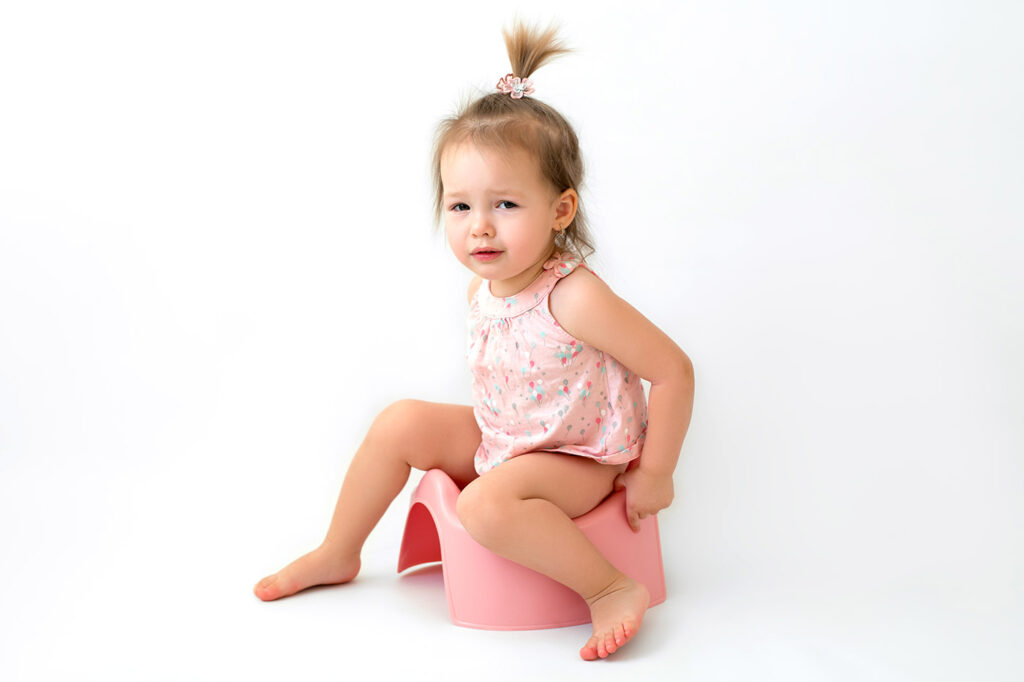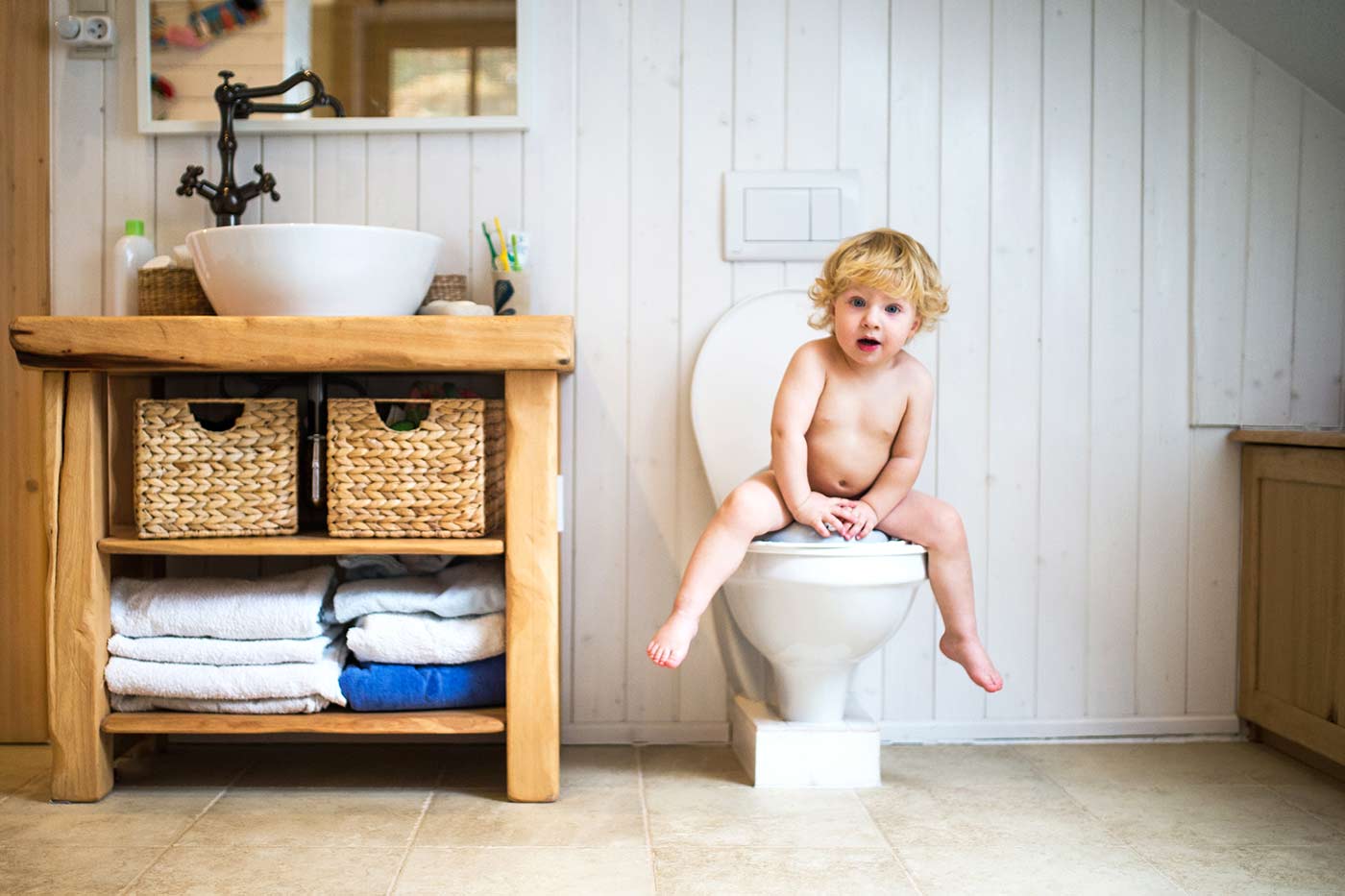What to Do When Your 3 Year Old Won’t Potty Train
Potty training can be a difficult and frustrating process, especially when you’ve tried everything. If your 3 year old won’t potty train, check out these tips you may not have tried—they just might work!

Everyone kept telling me my son would use the potty when he was ready. Still… as the weeks and months ticked on, I couldn’t help but wonder, Okay, WHEN will he be ready?!
I tried so many methods and incentives to potty train yet he still refused to go. We even stopped potty training and waited, only for him to refuse even more when we resumed. And I was getting especially worried when every other 3 year old I knew was already potty trained—except him.
It was then that I had to rethink the whole potty training process and what would truly help him. I quickly learned that it wasn’t about stickers and candy, nor was it about forcing him to go (because you really can’t).
Instead, I found a different approach that even the exasperated parent who has all but given up can try. If you find yourself with a 3 year old who also won’t potty train, take a look at these tips:
Table of Contents
Encourage independence
Kids are wired to become more independent and do things for themselves as they grow up.
This budding independence can give your child a sense of accomplishment at having done things that you normally would’ve done for her. She also realizes that she can do so much more than she may have initially thought and may be motivated to do even more. Having the autonomy to do these tasks in her own way can make her feel more invested in following through with them.
For potty-related tasks, encourage independence by having her put and remove her own undies or washing her hands. Have her pull the toilet paper or move the step stool next to the toilet seat.
Extend this “big kid” independence in her daily life as well. Allow her to feed herself as much as possible, let her pick out her own clothes, and have her pack her schoolbag. You’ll be there to guide and even show her how these tasks are done at first. But over time, she can assume many of them herself.
Becoming more independent—whether with potty training or daily life—can encourage her to take the lead with using the potty instead of always needing your help to do everything.
Free email course: Want to potty train without the power struggles? Join my newsletter and sign up for the free 5-day email course, Peaceful Potty Training! No more putting unrealistic deadlines on your child or using rewards that fizzle. Sign up for the email course now:

Explain the downsides of not using the potty
Kids this age can understand the consequences of their actions and weigh them against other options. Explain what happens when your child doesn’t use the potty or has an accident. That way, she can see the benefits of potty training if only to avoid these consequences.
For instance, you might have to give her a midday bath because of a messy accident or enlist her help in cleaning one up. You can’t go to a favorite place (or have to leave one) because there isn’t a convenient way to change her diaper. She has to stop a fun activity to change her diaper (whereas using the potty would’ve been much quicker). Or it’s having to go to the store to buy another box of pull-ups instead of playing at home.
Keep these reasons authentic—the last thing you want is to make up stories to try and trick her into using the potty. Give real reasons why using the potty is a benefit and how relying on diapers is holding her back.
Provide encouragement
Imagine your 3 year old as an older child, perhaps a 10 year old, with a lofty goal. Maybe he wants to score an A on a math test, level up to the next martial arts belt, or win the school spelling bee.
If I had to guess, you’d likely encourage him along the way. You’d make sure he sets aside time to study, praise him for improving his moves, or coach him through words he may have missed.
In other words, you’d be in his corner through and through.
Well, I’d say the same should happen with potty training. Be his biggest cheerleader and remind him that he can do this. Motivate him with encouraging words and acknowledge the behavior you want him to keep doing. And praise him for progress, not just perfection. Sure, he still won’t poop on the potty, but at least he told you that he had soiled his undies.
And just as you would be proud of him for his other achievements, you can also celebrate all he has done with potty training. Perhaps you’ll call grandma to tell her that your child peed in the potty or let him “overhear” you share with your spouse that he sat on the seat this morning. Hearing your praise can motivate him more than any reprimand you may give.
On that note, avoid negative connotations with potty training. Respond in a matter-of-fact way to accidents and don’t punish him for having them. Avoid turning this into a power struggle and fueling his potty training resistance. He may be physically ready but resists because he senses that this is a “big deal” to fight about.
Just as you wouldn’t berate him about a spelling bee, so too should you remain encouraging about potty training.

Make sure your child is comfortable
Consider the whole potty training experience from your child’s point of view. Are there ways you can make the process more comfortable, one where she can actually pass bowel movements easily?
For instance, having her sit on a potty with her bare feet on the cold floor might not be the best feeling (placing a rug beneath her feet can help). Sitting on a regular toilet with her legs dangling in front of her isn’t an ideal position to poop. Maybe the sound of the vent is too loud or she doesn’t have much to keep her entertained and distracted.
Consider her clothing as well. It’s much easier for her to pull elastic stretch pants up and down than a stiff, buttoned pair of jeans. A long shirt might make it harder (and messier!) to pee.
Expert tip
Make sure her knees are above her hips when she sits on the potty. If she’s using a toilet seat attachment, place a step in front of the toilet where she can place her feet. This will elevate her knees above her hips.
Don’t have a backup
At this stage, you can likely ditch diapers and pull-ups completely and rely solely on undies. After all, imagine going on a diet but knowing that there’s a carton of ice cream in the freezer. It’d be pretty hard to commit, right?
The same is true with potty training and having diapers and pull-ups “just in case.”
Yes, this means your 3 year old might wet their pants during the day and have plenty of accidents. But the best way to get the point across that there’s no other choice but undies is to remove the other choices.
Prepare yourself and expect accidents, and do what you can to make cleanup easier. You might want to keep extra rags and cleaning supplies stocked and limit your outings for a brief time.
That said, our pediatrician told us that we can’t really potty train for the night the way we can during the day. So, use overnight pull-ups at night when your child is asleep, but for the rest of the day, keep her in undies.
Keep your child bare bottom
One of the best ways I helped my son finally take to potty training was to reserve a three-day weekend to keep him bare bottom. No diapers, pull-ups, undies, or even pants and shorts.
Known as potty training in three days, the benefit of keeping your child bare bottom is that she will quickly be aware of her bowel movements. There won’t be a diaper to absorb her pee or undies to carry her poop. She can tie the sensation of needing to go with seeing and feeling it on her body.
This also provides the opportunity to take her to the bathroom as she’s having an accident. Even if you don’t make it in time or she hardly has any pee left to go in the potty, you’re still tying the urge of needing to go with heading to the bathroom. That way, she learns that she can go to the potty whenever she has the same sensations again.
Believe that your child will be potty trained
Barring medical conditions, we don’t meet adults or even kindergarteners who aren’t potty trained. Even the most strong-willed child, the child who isn’t getting any younger, still finds herself potty trained at some point.
I share this so that you can let go of the anxiety and frustration that may be tainting your potty training process. You must truly believe that she will be potty trained, even if she’s already 3 years old and has been putting up a fight.
This reassurance can hopefully erase the stress, disappointment, anger, or fear you might feel about her potentially meeting this milestone. The more faith you have that this will work out, the more relaxed you’ll feel. And she’ll sense that and stop fighting this issue.
Even if she’s not putting up a fight, knowing it will all work out will save you the headache of stressing about a future that may not even happen the way you worry it will.
Frequently asked questions
Your child can ditch overnight pull-ups and wear undies at night when she can wake up dry for five days in a row.
Reach out to the school. More than likely, they have that rule in place because they can’t have a whole classroom of kids who aren’t potty trained—otherwise, they’ll spend a lot of time changing diapers.
But if your child is the only one (or one of a few) who isn’t potty trained yet, they may be able to work with you on getting her up to speed. In fact, exposure to other kids using the potty can be just the thing she needs to finally take to it.
Conclusion
It’s never easy when your 3 year old won’t potty train, especially when you feel like you’ve tried everything. Hopefully, you now learned a few out-of-the-box strategies to change course and get her out of diapers and pull-ups. So that someday soon, you won’t have to wonder when she’s finally ready to be potty trained.
Get more tips:
- How Many Potty Training Accidents Are Normal?
- 6 Signs Your Child Is Not Ready for Potty Training
- Realistic Examples of a 3 Year Old Daily Schedule
- 6 Do’s and Don’ts When Your 3 ½ Year Old Is Not Potty Trained
Don’t forget: Join my newsletter and sign up for the free 5-day email course, Peaceful Potty Training below—at no cost to you!

